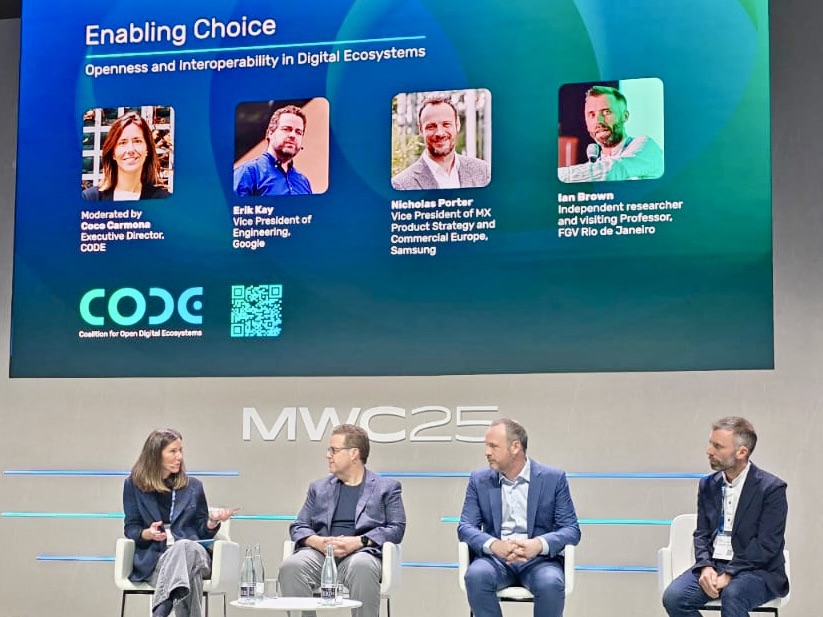Openness and interoperability at MWC
The annual Mobile World Congress in Barcelona is undoubtedly the glitziest, most gigantic, shiniest tech exhibition I’ve ever been to 🪩
This year’s featured a panel from the Coalition on Open Digital Ecosystems featuring Google, Samsung and me! In particular, I talked about the independent assessment I recently completed (commissioned by Meta) of proposed iOS interoperability measures under the EU’s Digital Markets Act.
Unfortunately the session wasn’t recorded. But since I made notes in preparation for the planned questions, I can happily share an extended version…
From your research, what are the most compelling benefits of open digital ecosystems, and where do you see the biggest opportunities for Europe?
The classic competition economics argument is: “Interoperability would facilitate ongoing competition on the merits of the user experience, rather than on the size of the installed base, and potentially stimulate robust competition… With easy interoperability, users will be free to make a real choice about which service they prefer. This will encourage new market entry and vigorous competition between providers.”
This has an additional importance for EU digital services firms, which are increasingly dependent on (US and Chinese) gatekeeper firms for access to their potential customers in Europe and elsewhere. Gatekeepers have an incentive to exclude competitors from any market where they also have an interest, and extract value as it flows between market participants across their coordinating platform.
Interoperability can enable competition between “free” (ad-supported) services on quality factors, such as privacy and security. And it can enable the service plurality and diversity — linguistic, cultural, and demographic — which are important for European fundamental rights (according to the EU’s General Court in the Google Search case).
As Netscape Navigator creator and now-infamous venture capitalist Marc Andreeson said, “software is eating the world” – transforming industrial sector after sector through digitisation. So ensuring these markets remain fair and contestable has a wider importance for many industries Europe currently excels at, notably automotive.

Your research, including your most recent study, suggests that interoperability can be achieved without compromising security or privacy. That is, interoperability can actually work without increasing risks. In your view, what best practices should industry follow to ensure openness benefits consumers while maintaining strong safeguards?
Most importantly, industry should cooperate on setting security standards – as GSMA is doing – and sharing information in a timely way to address any security/privacy issues. This should cover standards-setting, enabling third-party auditing, discovering implementation errors, and sharing threat intelligence.
Europe’s DMA explicitly allows information sharing for spam detection for messaging/conferencing interoperability.
What are the biggest risk areas that you think companies need to work together to resolve?
- Setting common standards for user control and access to/use of personal data, in particular developing agreed data minimisation rules. These need to be strictly enforced to stop interoperability degenerating into a Real-Time Bidding-style ad-profiling horror story.
- Working on Privacy Enhancing Technologies to enable further safe data sharing, eg privacy-friendly friend-finding OS services to enable social graph portability.
Can you share examples where open ecosystems have enhanced user experience—either in mobile, software, or other digital sectors?
Thanks to Google’s Rich Communication Services (RCS) development and implementation in its messaging app, Android users around the world can share end-to-end encrypted messages with each other without needing support from both sender and recipient’s mobile network. Any other messaging product is free to implement these extensions 👏
“Privacy and security-first” Apple has taken the first steps towards supporting RCS (allegedly due to Chinese regulatory requirements), but (as usual) is slow-walking the process. It does not (yet) implement end-to-end encryption, and is enabling bureaucratic and business roadblocks (such as requiring sender/recipient mobile network support.) It seems it would prefer its users to have to send unprotected plaintext messages to their Android-using friends and family 🤯
This is a reminder of the benefits designating iMessage under the DMA would have had, which unfortunately — apparently under great pressure from Apple, including a visit from CEO Tim Cook — the European Commission held back from. I heard from an impeccable source the firm even threatened to withdraw the service from the EU if it was designated.
I wish Apple could get interoperability right even between their own products. About half of my e-mail inbox is currently responses to an iCal invite to my forthcoming birthday party I shared by e-mail. iOS Mail can’t process the responses even from other Apple users. They will have to sit there until I get home to my MacBook 🤨
PS This blog post is brought to you via my iPad, with my brilliant new MoKo folding travel keyboard, and my Airalo eSIM — a testament to the benefits of interoperability 🥰

@ian openness at MWC! What a concept! Any discussion of Open Source and the CRA?
Not at our session. I don’t think open source was generally a big theme overall 😉